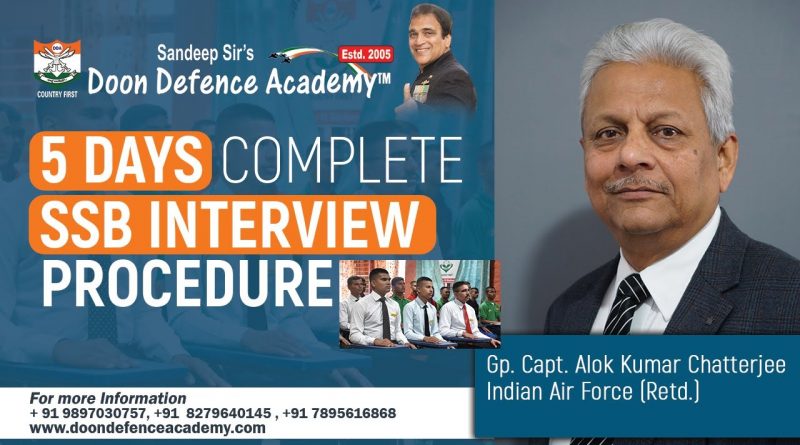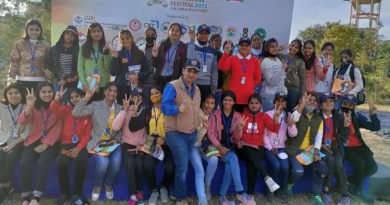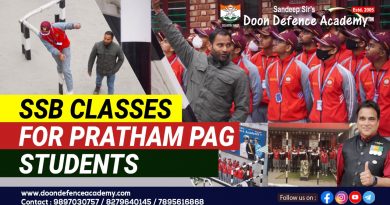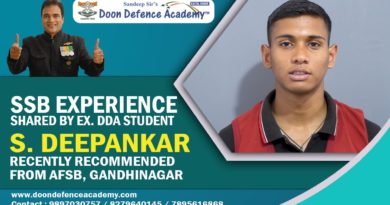Five Days SSB Procedure Described By Gp. Capt. Alok Chatterjee | Sandeep Sir’s Doon Defence Academy
FIVE DAY SSB PROCEDURE DESCRIBED BY Grp Capt.
ALOK CHATTERJEE
In a video clip, the retired air force Group Captain Alok Chatterjee is seen addressing the students to explain the complete 5 days SSB interview procedure. He had been in the category AGTO. The video is made to tell the students the selection procedure. After the document verification, the first test of the task is the OIR Test (Officer’s Intelligence Rating Test). The study material of DDA has all the instructions to qualify for this test. Then, the students are taken to a big hall where the students are shown a hazy picture to write a story on it as per their own perception and this test is named as PPDT (Picture Perception & Description Test). After the completion of the story, the students are taken in a group of 15 to 18 to different halls in which they will find a semi-circular sitting pattern. There, they are made to sit and discuss among their group their stories and come out with a group story. This activity is observed by the officials of the Service Selection Board. The task given will make the students qualify the screening test and the officers observing decide whether they have been selected for the next stage or not. If you are rejected you will be returned and dropped at the station whence you were received.
The second phase of the testing procedure is the Psychology Test which might be conducted the next day. This test comprises a Thematic Apperception Test (TAT) where you are shown a series of twelve slides of which eleven are picture slides and the last one is a blank slide. You are supposed to frame stories according to you what you perceive. This test is followed by a Word Association Test (WAT) where you are shown a series of 60 words one after the other with a warning saying next and you are supposed to look for the next word and start writing about it whatever comes to your mind first. For each word get 15 seconds to frame a sentence. The last test under this is the Situation Reaction Test in which 60 situations will be shown to you on a booklet and not on a slide and you are supposed to refer to the booklet and then write your reactions to those real-life situations in the answer script.
Then comes the culmination of the Psychological test. Either it will be a group task or an interview. These are allotted according to the groups divided after the screening test.
The group task is to check the group dynamics of the candidate. It may be a two-day task or one day. The two-day task may be divided into two parts taken in two phases. That is generally a group discussion and two topics are given. It is up to your group which topic you choose. The candidate may speak in Hindi but try to come to English. The DDA SSB team’s expertise in the art of training the students can be relied upon for training the students and the results of the students who are getting selected verify the fact that DDA is making the students qualify for the test. It is to test your leadership qualities. The art of indulging in a group discussion can be explained to you and you can learn this skill with practice and demonstration at DDA. Remember it is a discussion and not a debate.
The Group Task has four stages and it must be borne in mind that the students are trained well at DDA to perform all the tasks and appear successful with astounding results. The cadet’s leadership qualities and his ability to lead, sense of responsibility, creativity, presence of mind, to make the best use of the resources present around him, and the spirit of camaraderie is tested here. The memories are sweet and bitter and the skill acquired by the students is truly relished.
During the interview, the students should remember that they have to be honest and not flaunt and not be vagrant while putting up the answers to certain questions. The questions asked are to identify the personality traits of the cadet. The rapid-fire session is to get spontaneous answers with the objective of finding the true person and this is the objective of the SSB interview. All the tests in the selection process are time bound so that the candidate is not able to manipulate and projects his inner true self. The SSB interview has to be taken seriously. Be composed, calm, and confident while facing the interview. The answers should be given as per the information given in the PIQ by the candidate. Be positive and honest while attempting the questions and it will be here at DDA, that all the shortcomings of the candidate are filtered. On the final day, the candidates are called one at a time in front of the entire panel involved in the selection after which the final results are declared.
The board assessors at the conference hall will be there to evaluate and have a final perspective on the cadets and this is the conference day with the cadets in formal dress and the assessors in their uniforms. Listen to the questions carefully and analyze them and answer them confidently. The duty selection officer will call the chest numbers of the recommended candidates and non-recommended ones have to return home to be dropped with their luggage at the station. The selected cadets will fill out a plethora of forms.
If your first choice was the Air Force, you will be directed back to the Air force selection board for undertaking the CPSS (Computerized Plot Selection System) test and the cadets need to remember that they need to take this test seriously because this test is conducted only once in a lifetime. The training imparted at DDA is really unique as to groom the cadets to be future ready for Defence training. Sandeep Sir’s Doon Defence Academy located at Sahastradhara Road in Dehradun has gained such popularity in the art of training the students aspiring for Defence that it ensures the highest selection of the students taking the coaching classes here to clear both the written test and the SSB interview. Moreover, the students are also guided about the documentation and the form filling procedure to avoid getting rejected and even the technical glitches that might be a hurdle. He wishes the students all the best in their training and tells that it all depends upon their merit, their luck, and the practice done to ensure successful selection.




